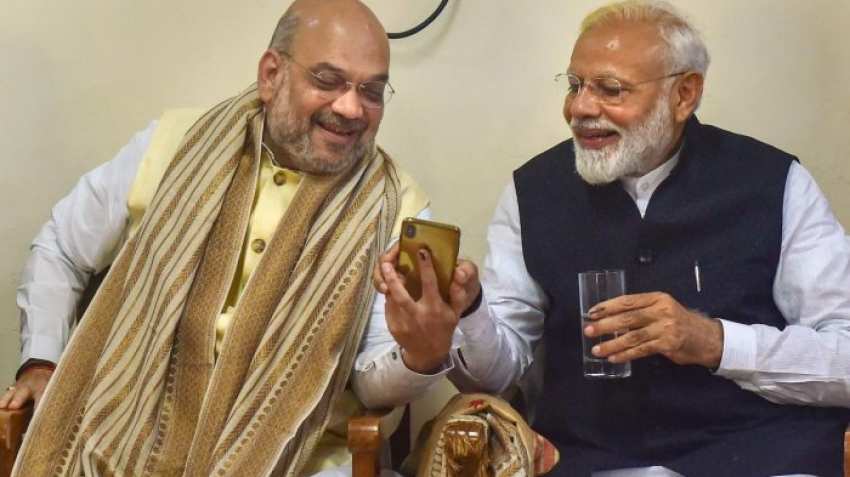As Amit Shah takes over as the new Minister of Home Affairs in the Modi Cabinet 2.0, debate and discussions and speculations over his tenure have already begun. Considered a hard taskmaster, Amit Shah’s role is now transformed from being the party chief to handling one of the most important portfolios in the Cabinet. Under the leadership of Amit Shah, BJP was successful in making deep inroads in new states where it had virtually no presence coupled with successful retention of previous political holds, his tenure can surely be considered among the best in BJP’s history.
Amit Shah became the youngest minister in the Modi Government in Gujarat and at one time held as many as 12 portfolios: Home, Law and Justice, Prison, Border Security, Civil Defence, Excise, Transport, Prohibition, Home Guards, Gram Rakshak Dal, Police Housing, and Legislative and Parliamentary Affairs. Given his experience, Amit Shah is likely a star performer in the Ministry of Home Affairs in the new Modi Cabinet.
However, for Amit Shah a series of challenges await. Under the leadership of PM Modi and ex-MHA Rajnath Singh, India has witnessed huge strides forward in multiple dimensions of the security situation in India. Be it the insurgency in North-East India or radical terrorism in Kashmir, our forces have been at their optimum, protecting India’s interests. Given his experience in Gujarat as the state home minister, Amit Shah’s term will surely see some conclusive steps, adding to the previous developments. Some areas which are expected to witness major efforts during Amit Shah’ tenure include:
A holistic amalgamation of Kashmir and crackdown on separatists:
BJP in its manifesto has already indicated towards a critical review of article 370 and 35A. These constitutional provisions for long have been used by a major part of local political leadership and separatist organizations to perpetuate the secessionist narrative. BJP’s call for a review of these Articles also met stiff resistance from localized political parties like National Conference and the PDP, with their leaders even indulging in blatant fear-mongering and in a sense blackmailing by leveraging the security situation in the Kashmir valley region. Security forces over the past few years have been successful in dismantling the terror mechanism which has been functional in the state. Now as the government proceeds to further its efforts towards the holistic amalgamation of Kashmir with the mainstream Indian population, firm hold on the security situation in the state is indispensable.
Moreover, the Modi government has pursued a policy of relentless crackdown on terrorists and separatists in the Valley. In the past five months, nearly 100 terrorists have been killed. A total of 20 terrorists have been eliminated this month alone. With Amit Shah as the Home Minister, the country is likely to witness more such crackdowns on the terror elements in Kashmir.
Counter Insurgency in North East India:
At present, violence in North-East has almost ended. States like Meghalaya and Tripura are completely free from militancy now. As a result, AFSFA was abolished from Tripura in 2015 and from Meghalaya in 2018. Steps taken by the security forces against terrorist and insurgent elements in North-East India have been fruitful, with major terror outfits now defunct or at their weakest. Nonetheless, a lot of issues still remain unsolved to have any conclusive benchmark. Recent terror attack in which Arunachal Pradesh lawmaker Tirong Aboh, his son and 9 others were killed by NSCN (IM) terrorists in Arunachal Pradesh’s Tirap district only point towards the unfinished business that needs urgent attention. Counterinsurgency in North East is poised to be the top agenda under Amit Shah’s leadership.
Anti left-wing extremism measures:
India over the past few years has witnessed massive efforts to counter left-wing extremism in affected areas. This menace of Maoists which has been perpetuating for long is still short of total eradication. Recent Maoist attack in Gadchiroli also indicates towards the work which remains to be done in order to eradicate Maoism from India. Amit Shah, given his administrative experience and firm stand against urban-naxals, is poised favorably to further India’s efforts towards eradication of Maoism.
Increased coordination between centre and state:
The Centre-State division of the Ministry of Home Affairs deals with centre-state relations, including working of the constitutional provisions governing such relations, appointment of governors, creation of new states, nominations to Rajya Sabha/Lok Sabha, Inter-State boundary disputes, over-seeing the crime situation in states, imposition of President’s Rule and work relating to Crime and Criminal Tracking Network System (CCTNS). Amit Shah known for his negotiation skills and decades of experience in working with leaders across party lines is sure to give a huge boost to Centre-State coordination on relevant issues.
Counter-radicalization measures
With increased digital penetration terror outfits have been using this new space to forward their agenda and radicalize youth throughout the world. It is evident from a number of lone wolf attacks which were executed in Europe by individuals radicalized over digital platforms. Similar reports have also surfaced in India, reports which indicate towards a significant number of individuals from states like Kerala and Tamil Nadu getting radicalized over the internet and going forward to join terror organizations like ISIS. NIA and IB which report to the MHA are sure to increase their proactive counter-radicalization efforts under Amit Shah’s tenure.
Amit Shah will also be joined in the MHA by G. Kishan Reddy and Nityanand Rai as ministers of state.
